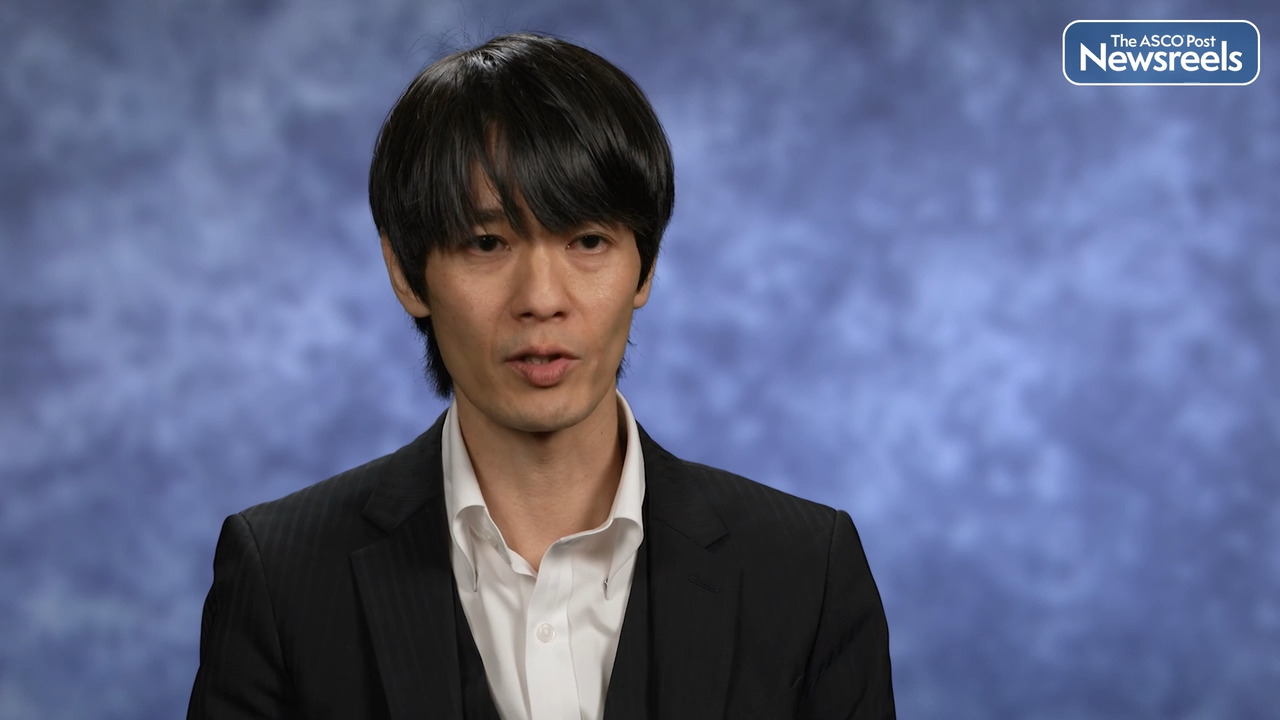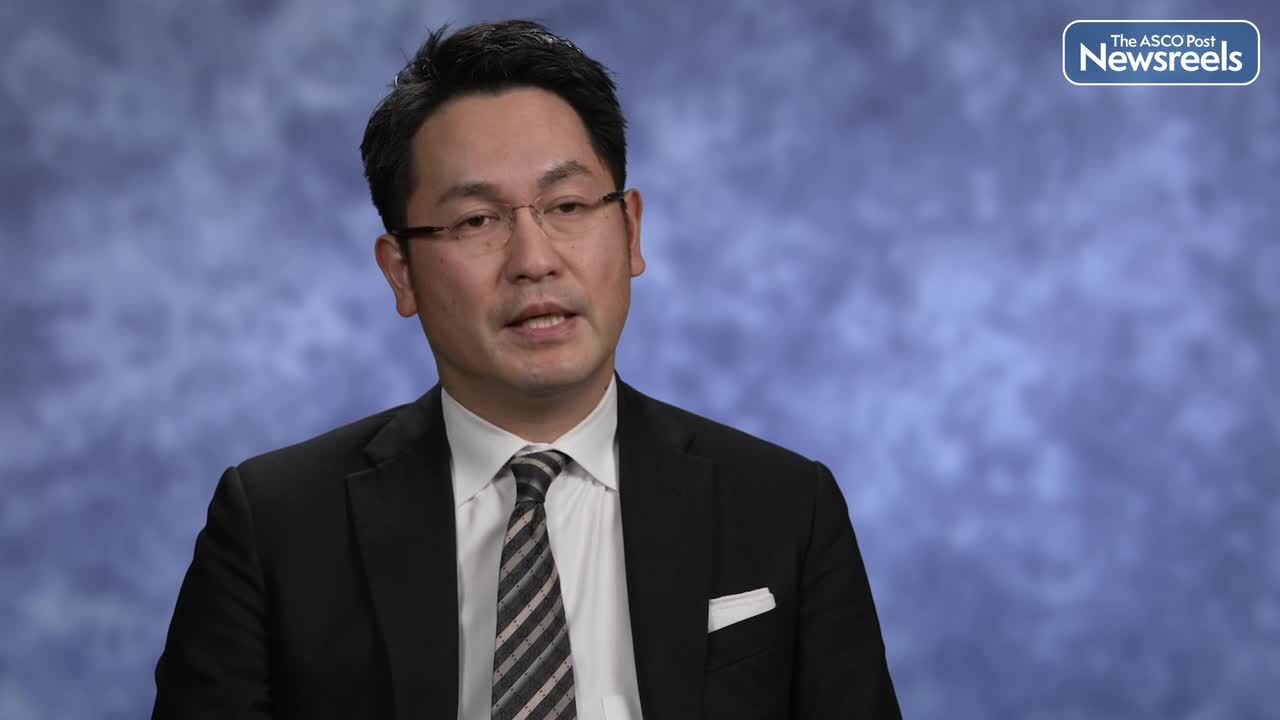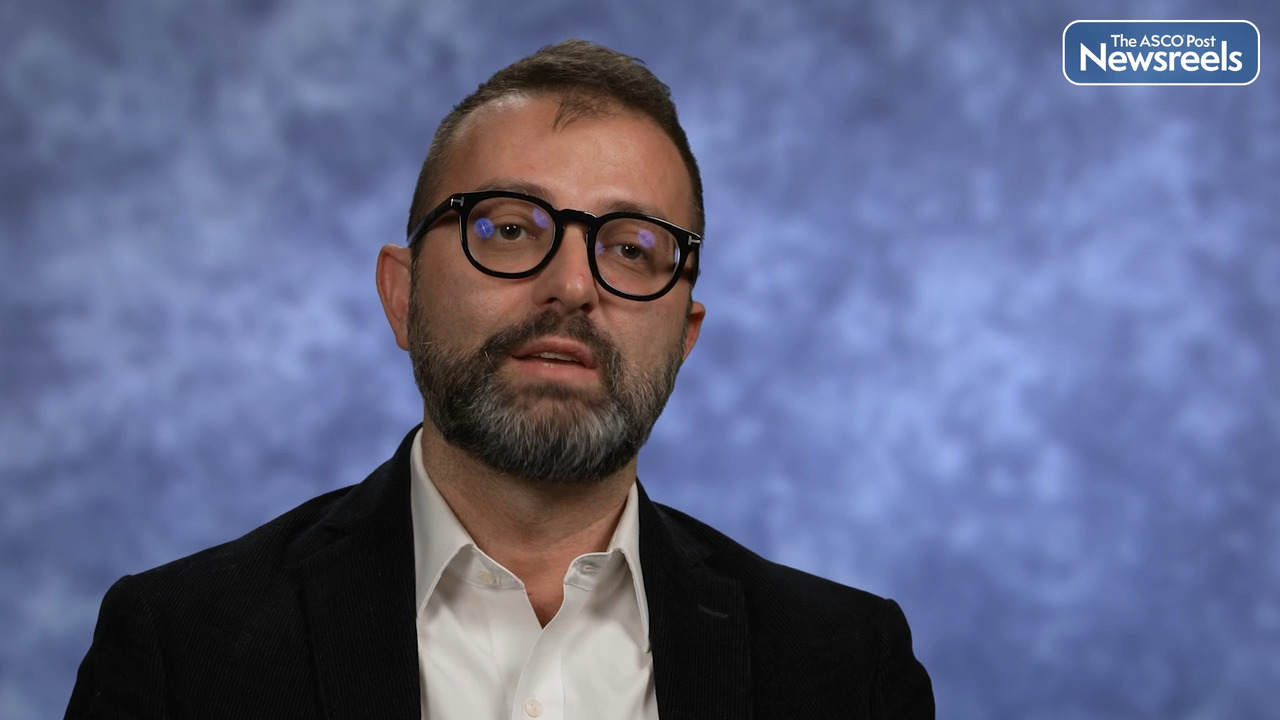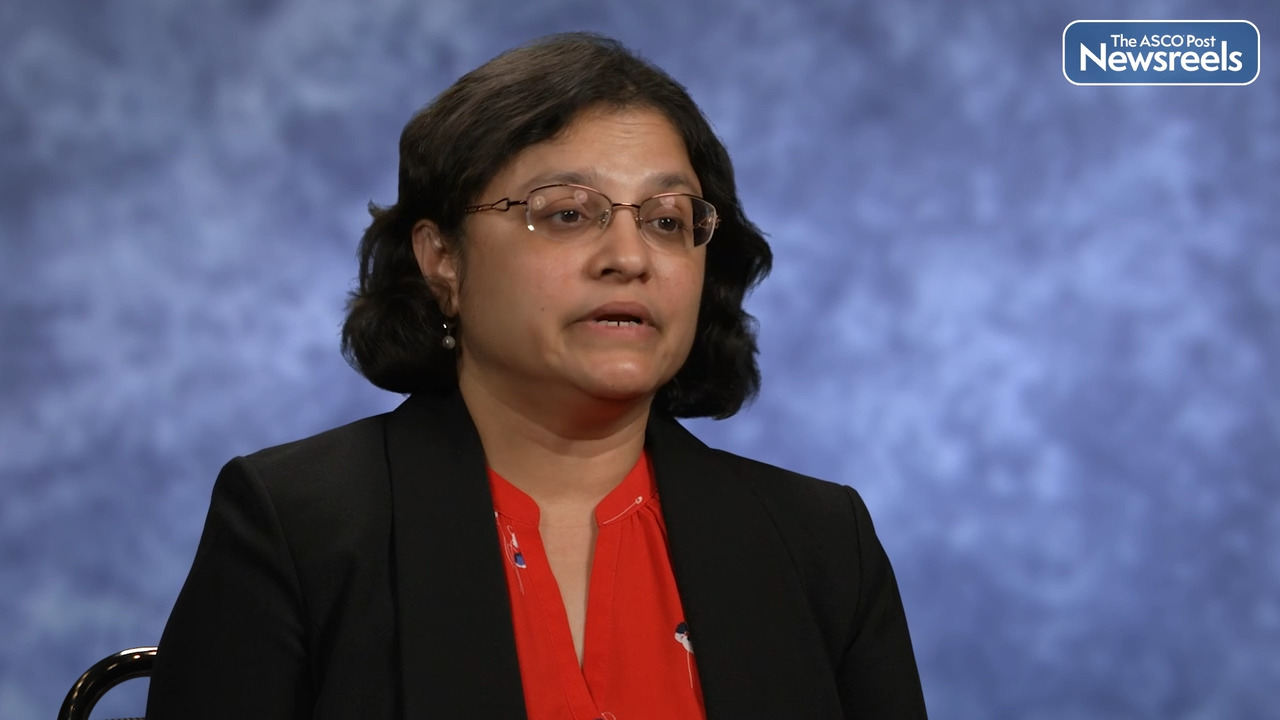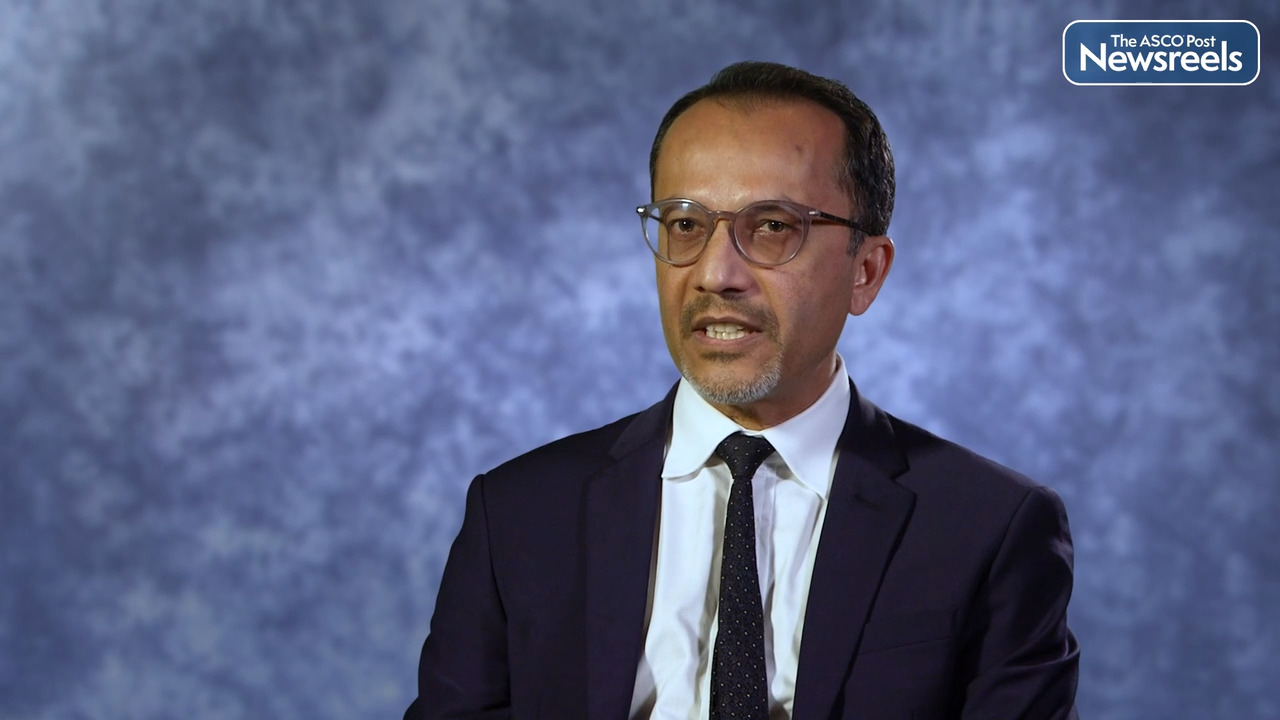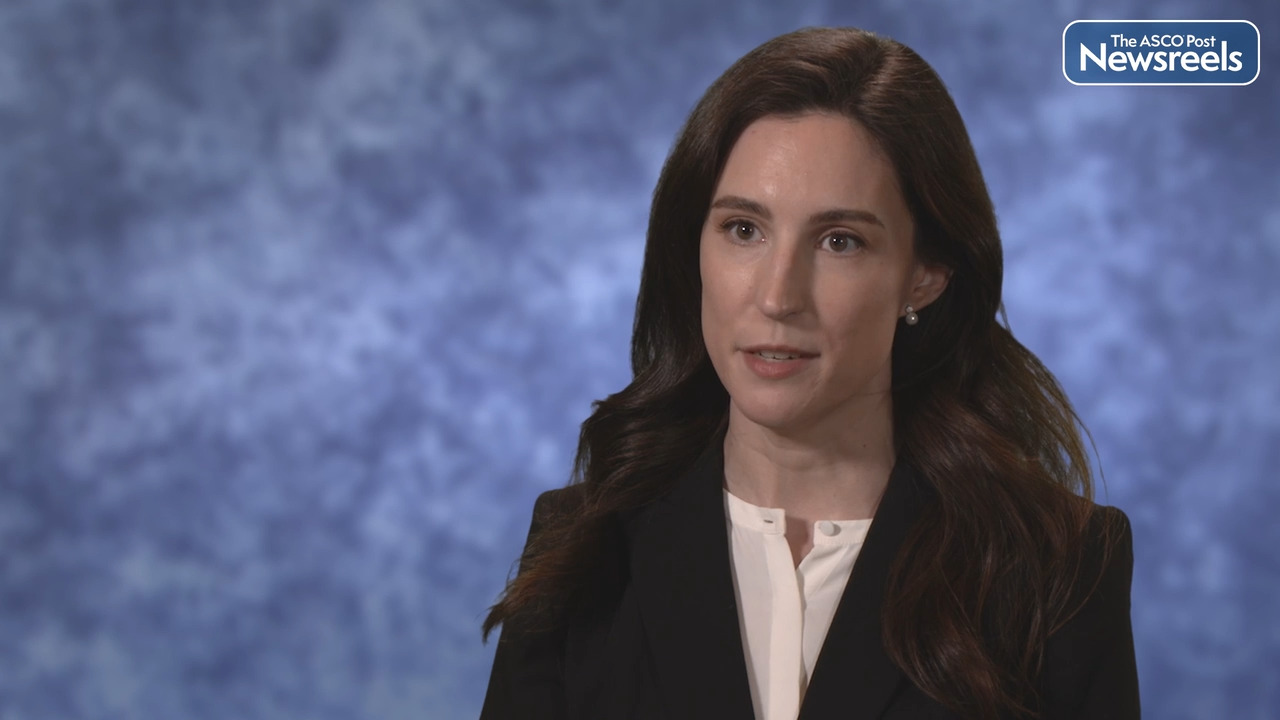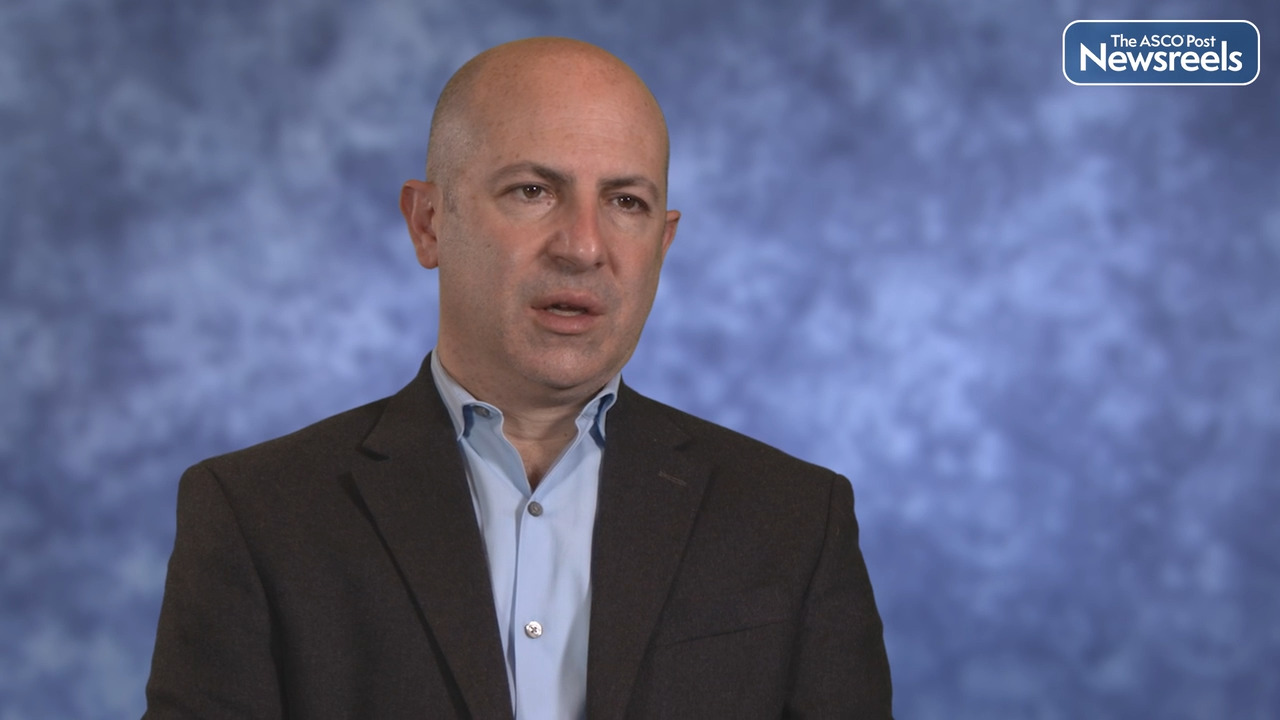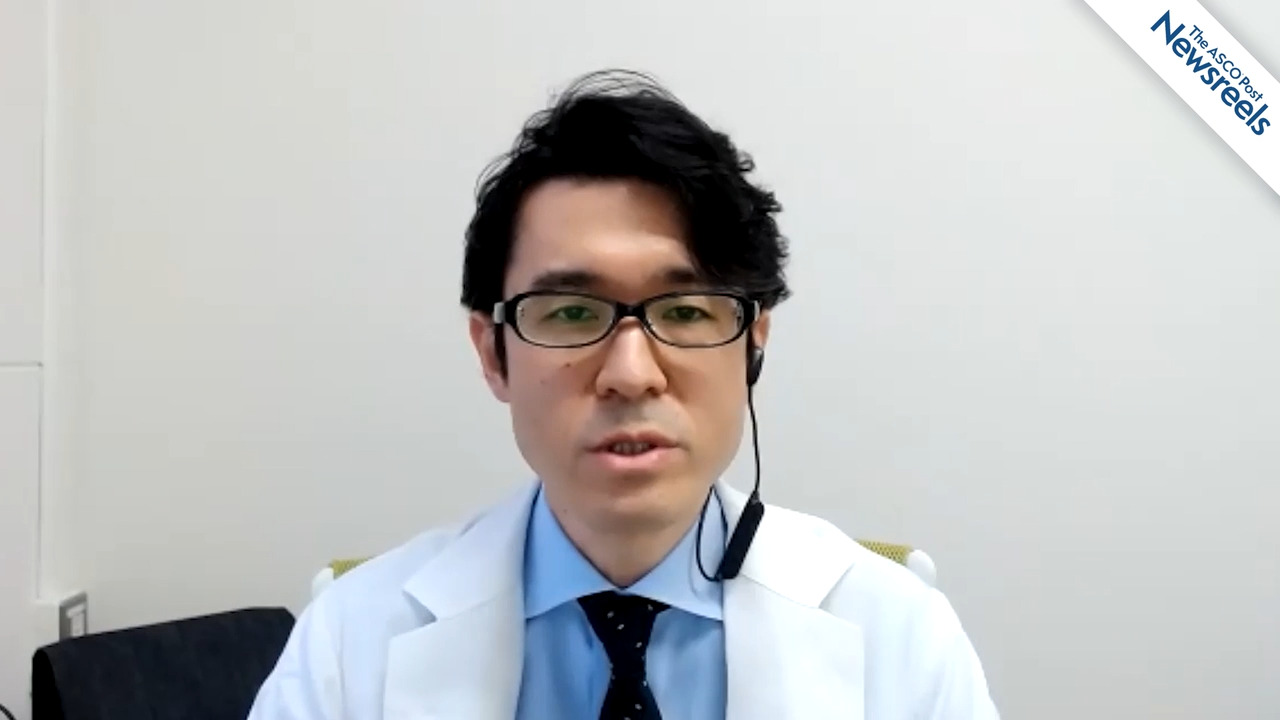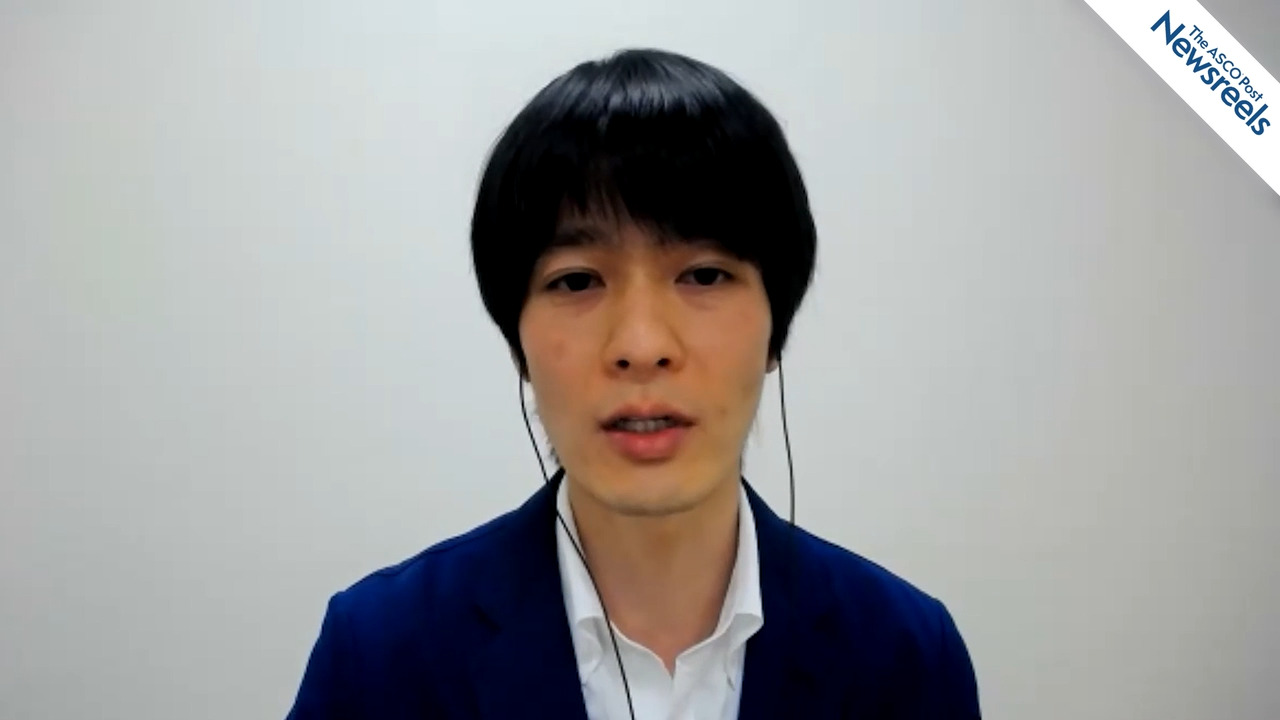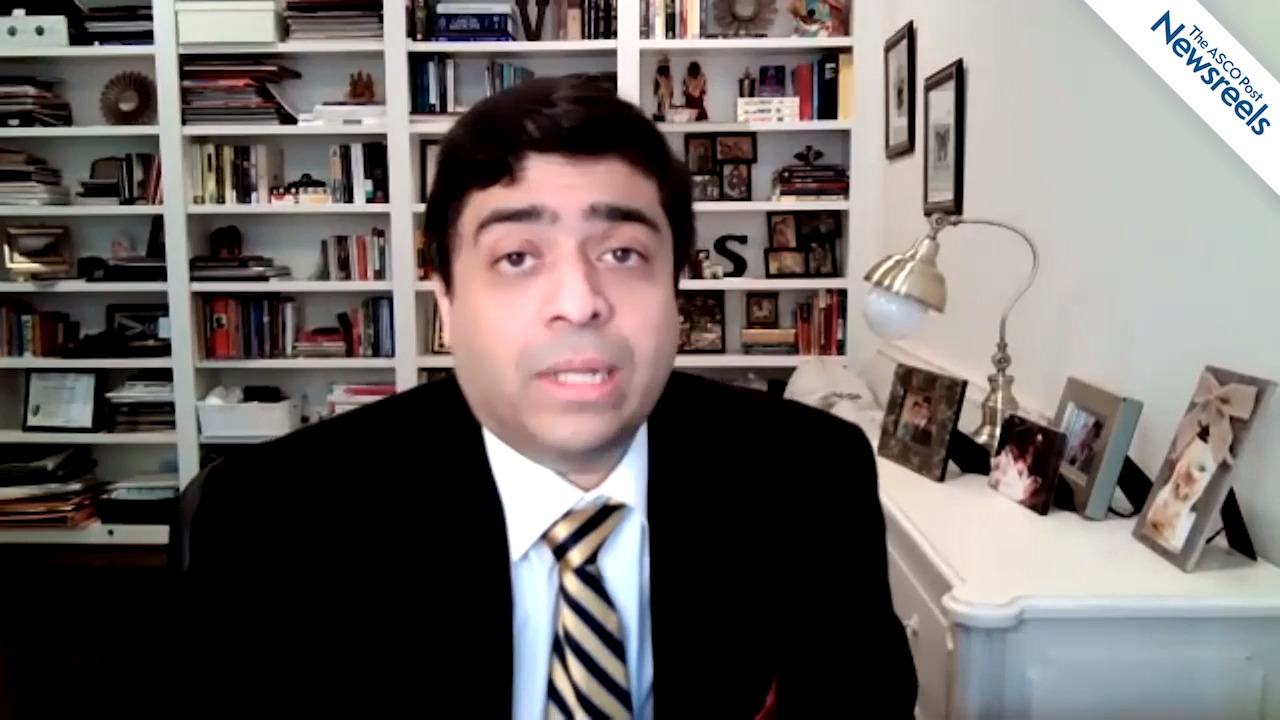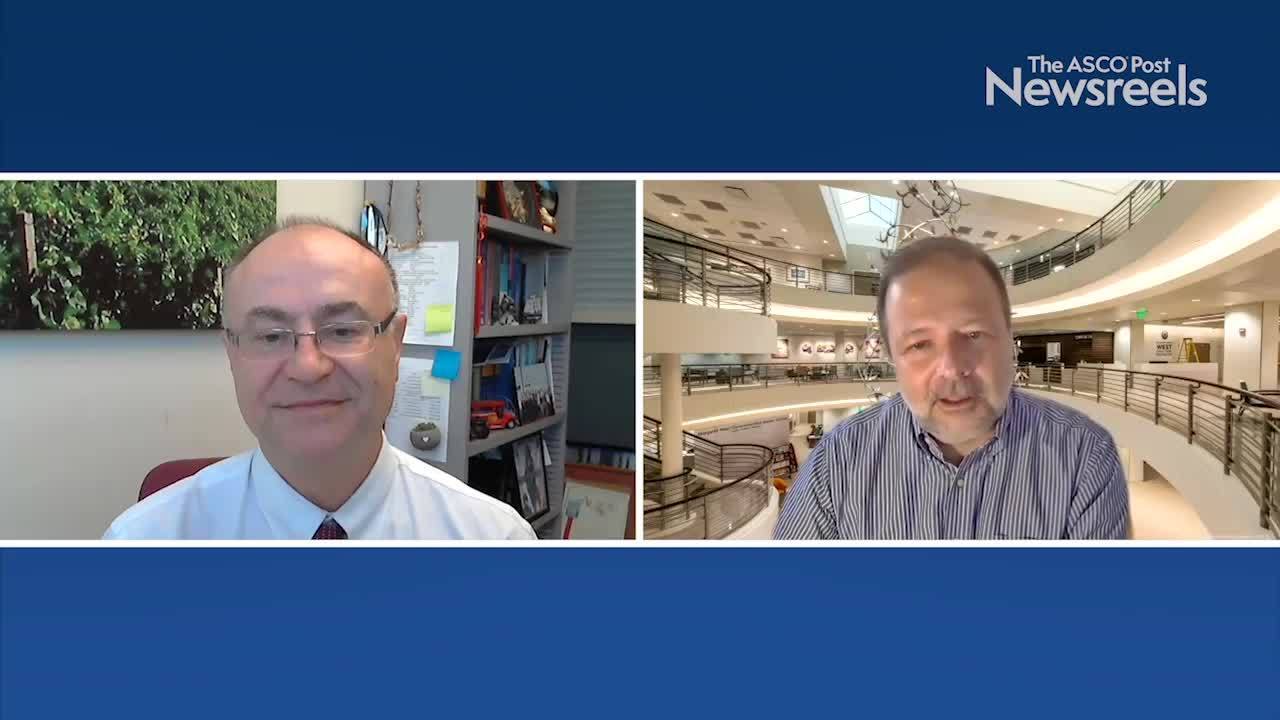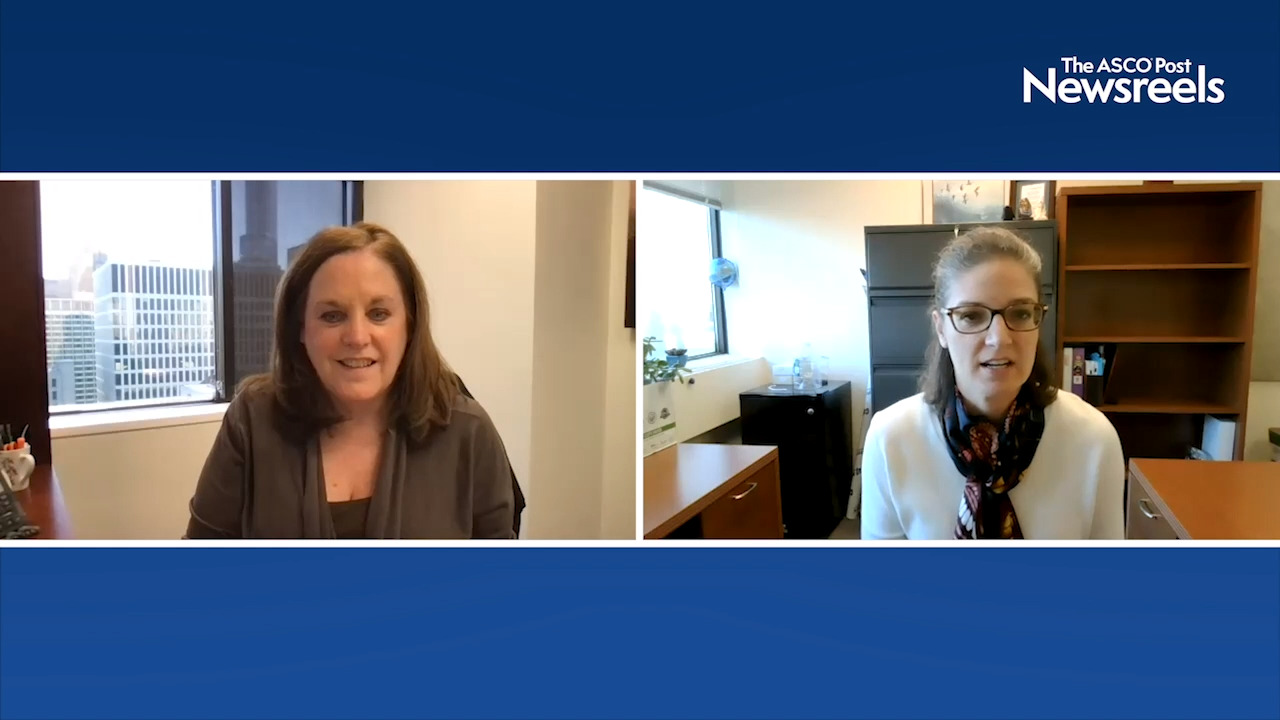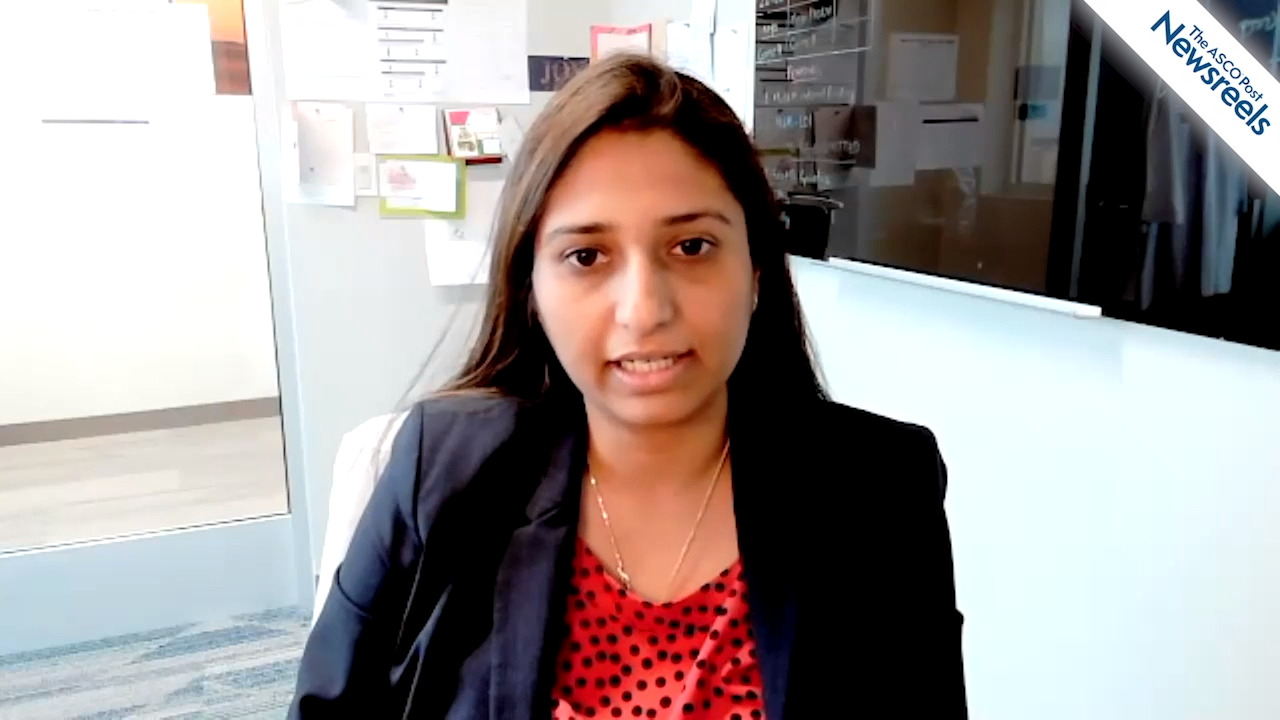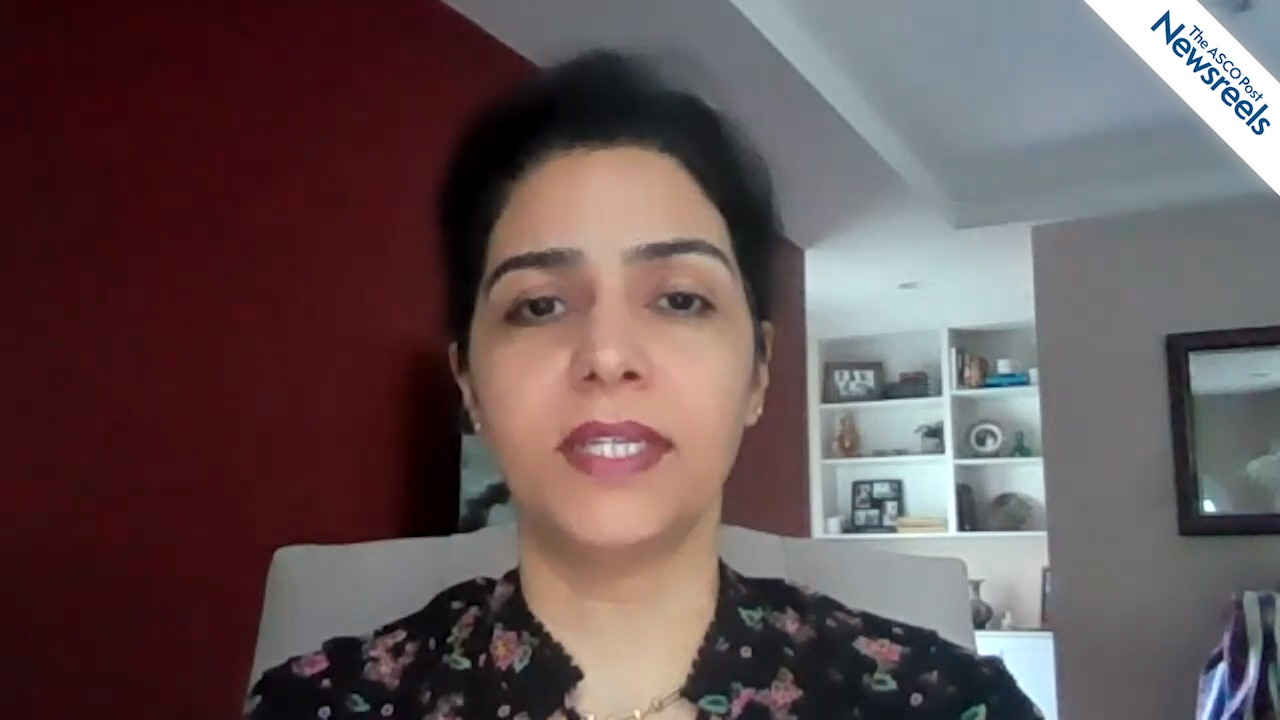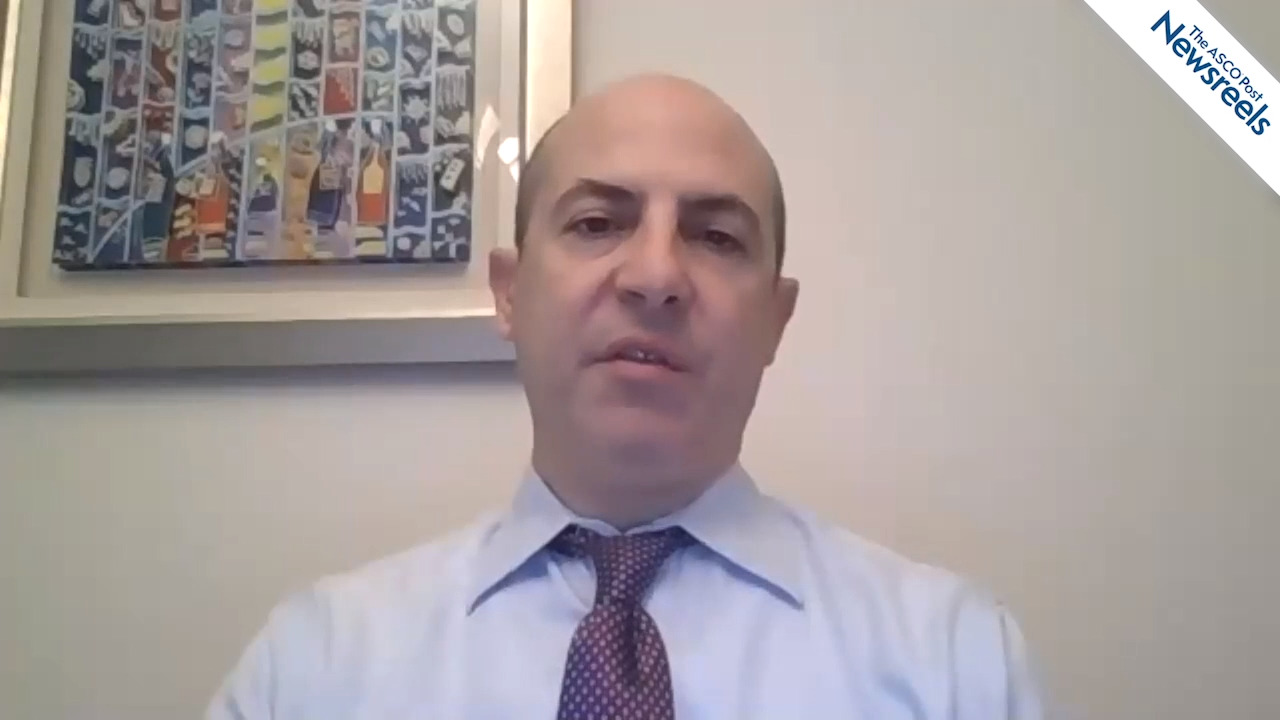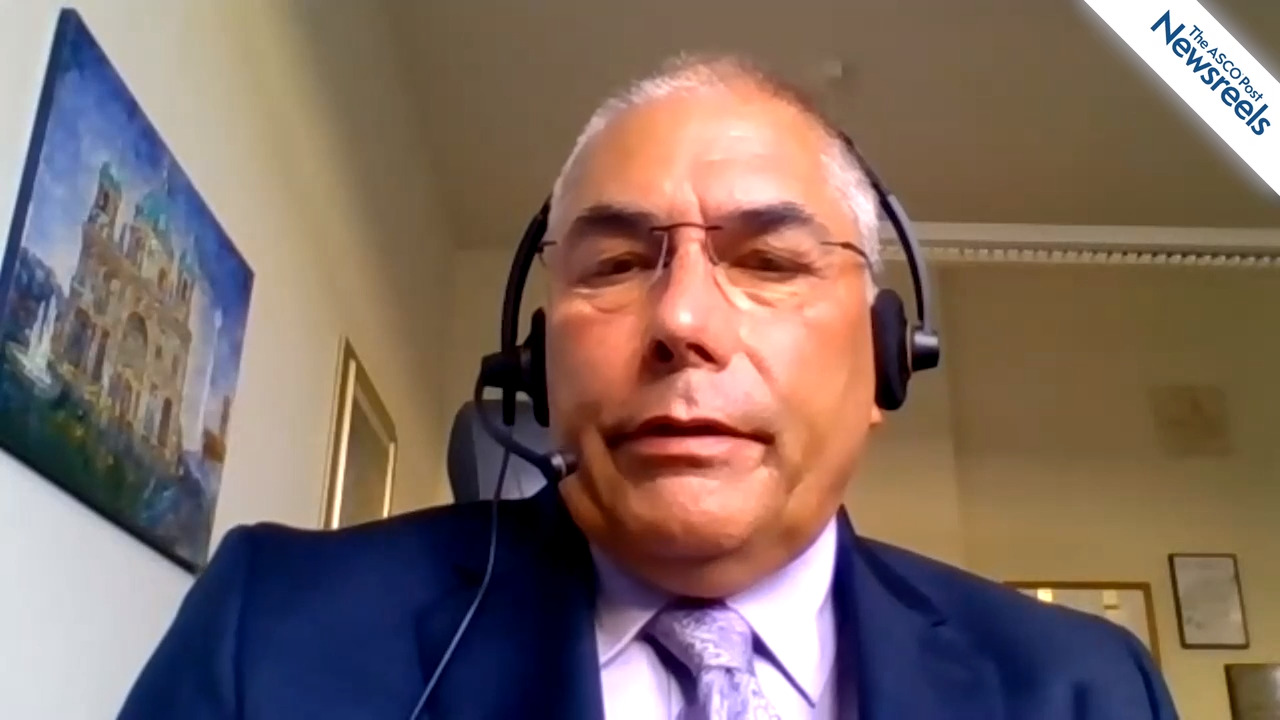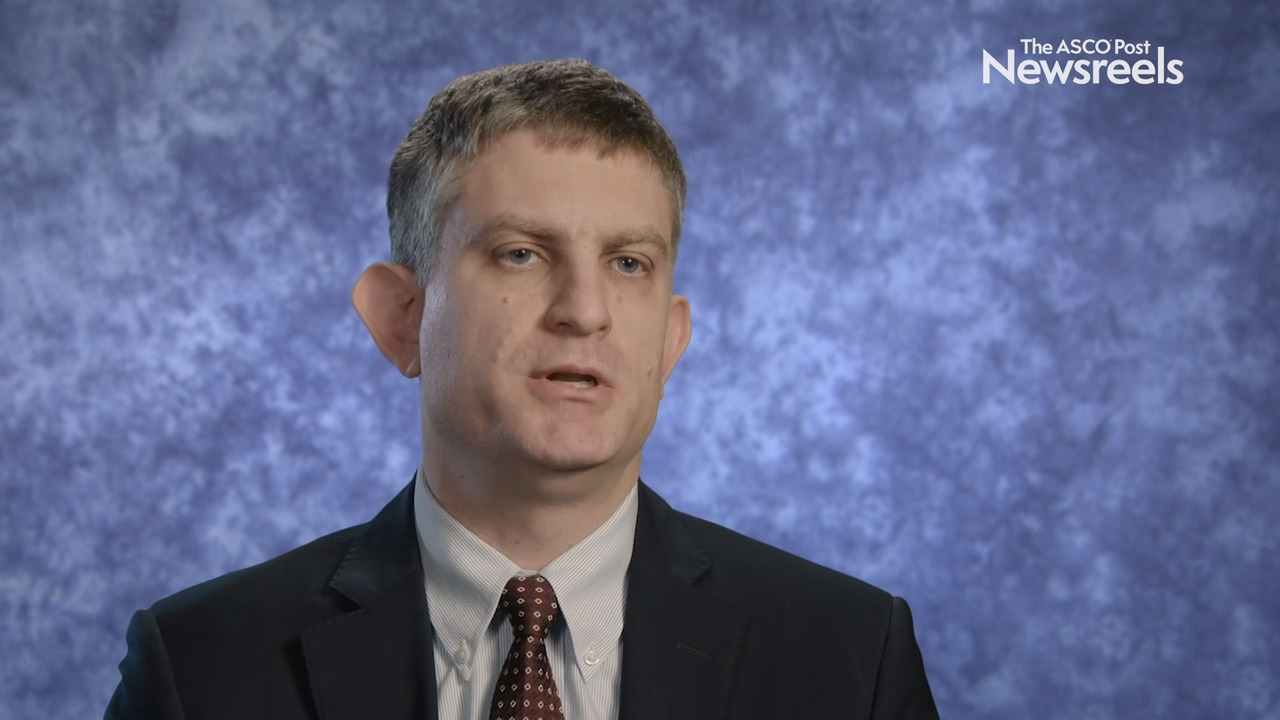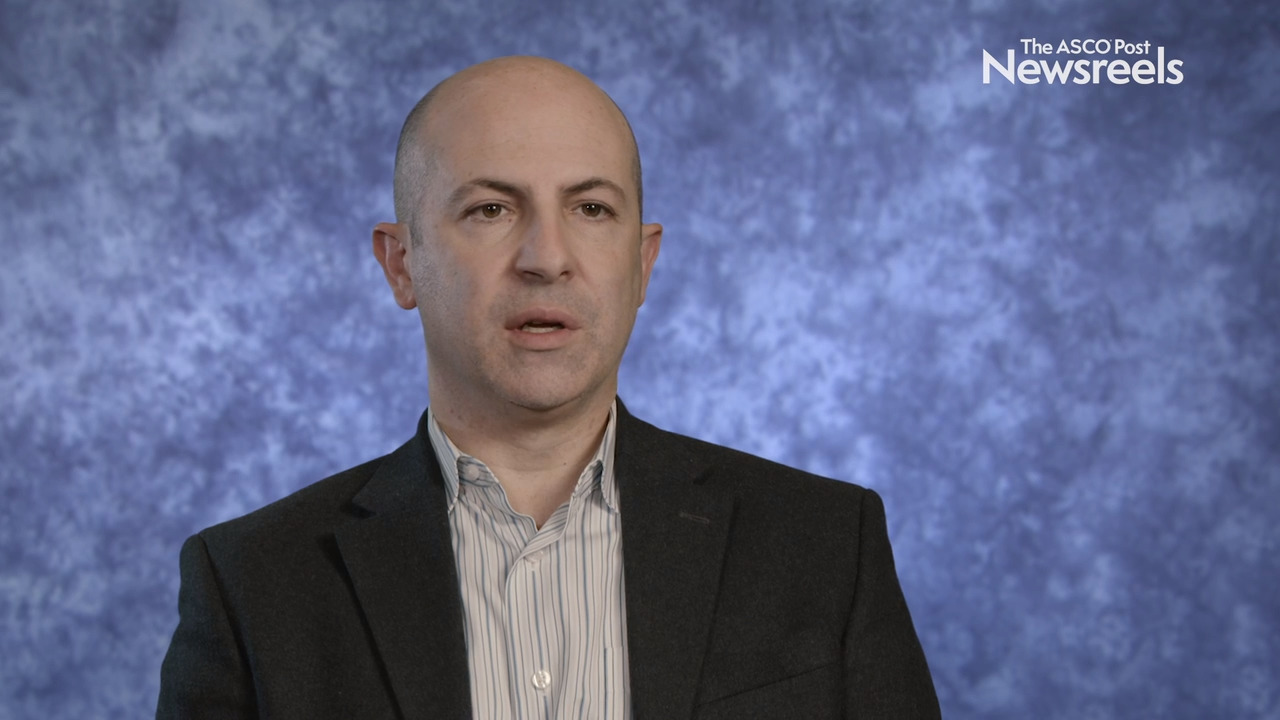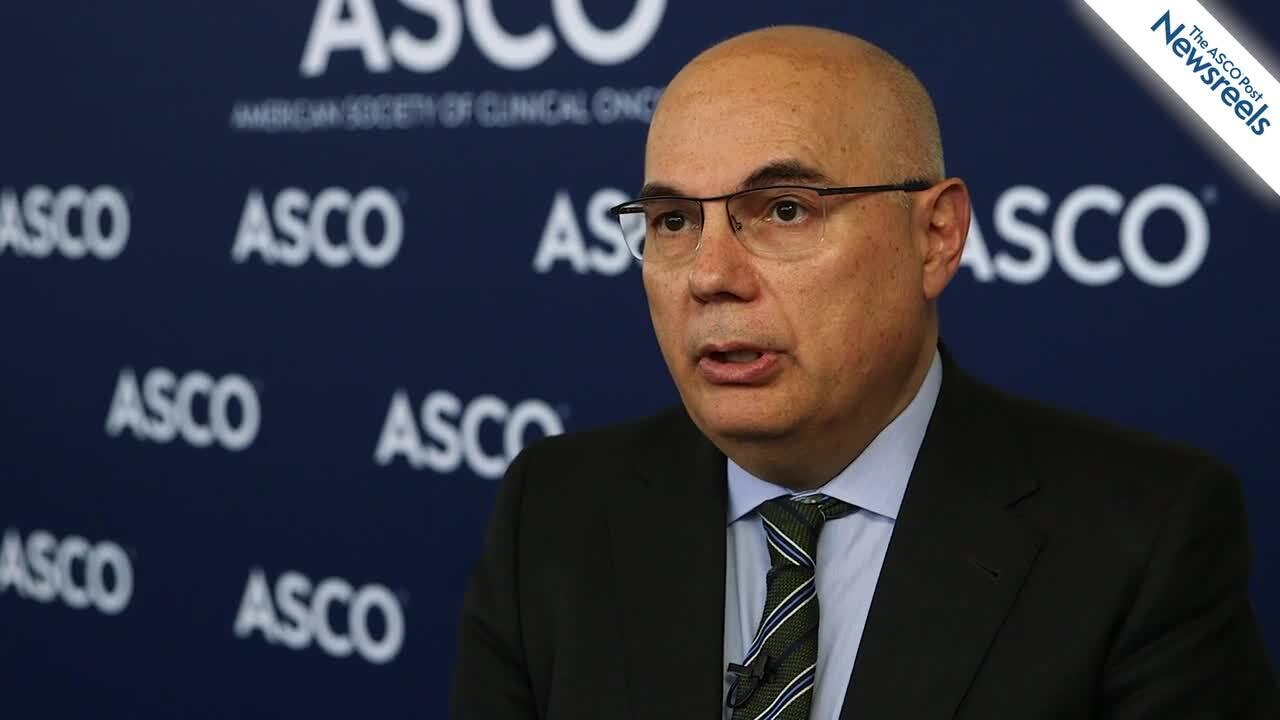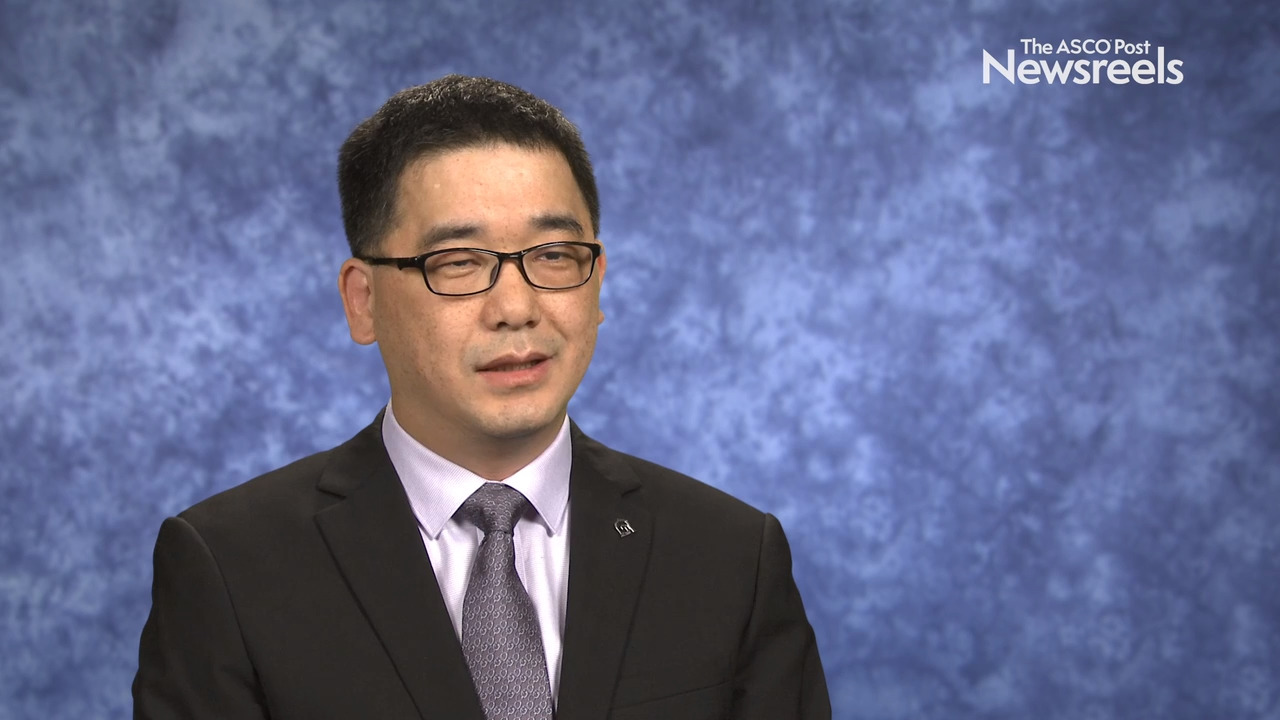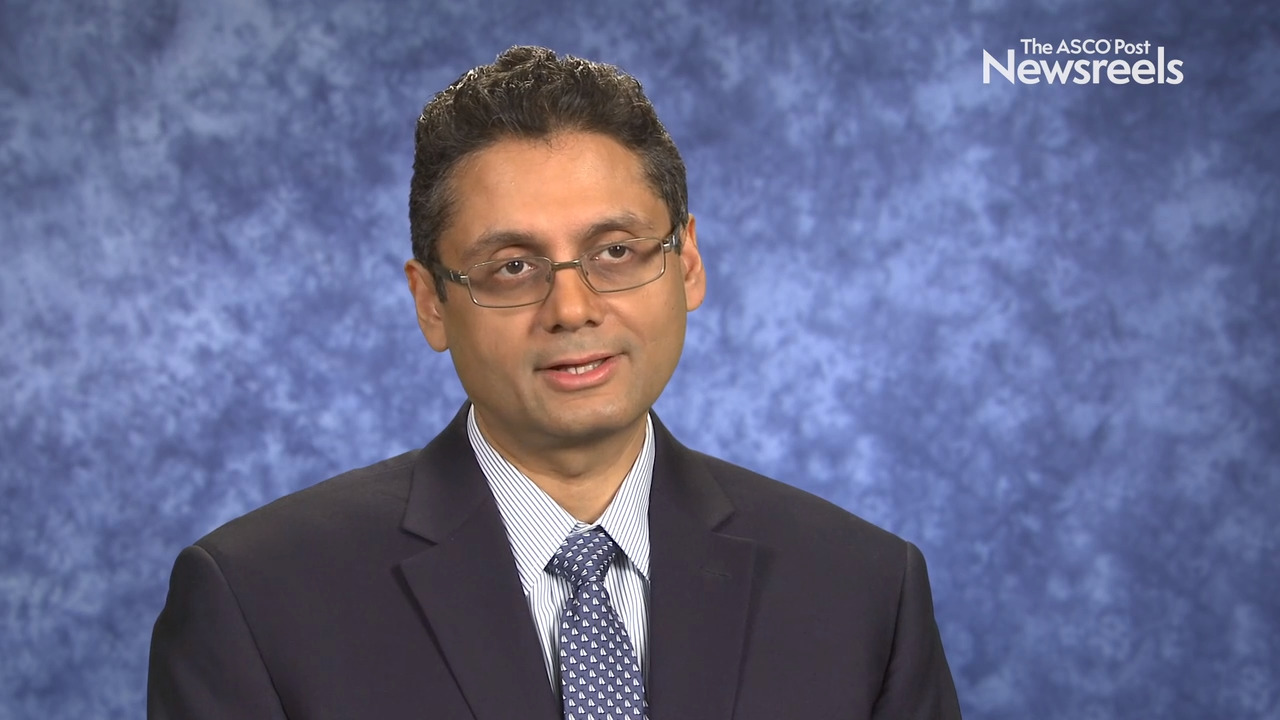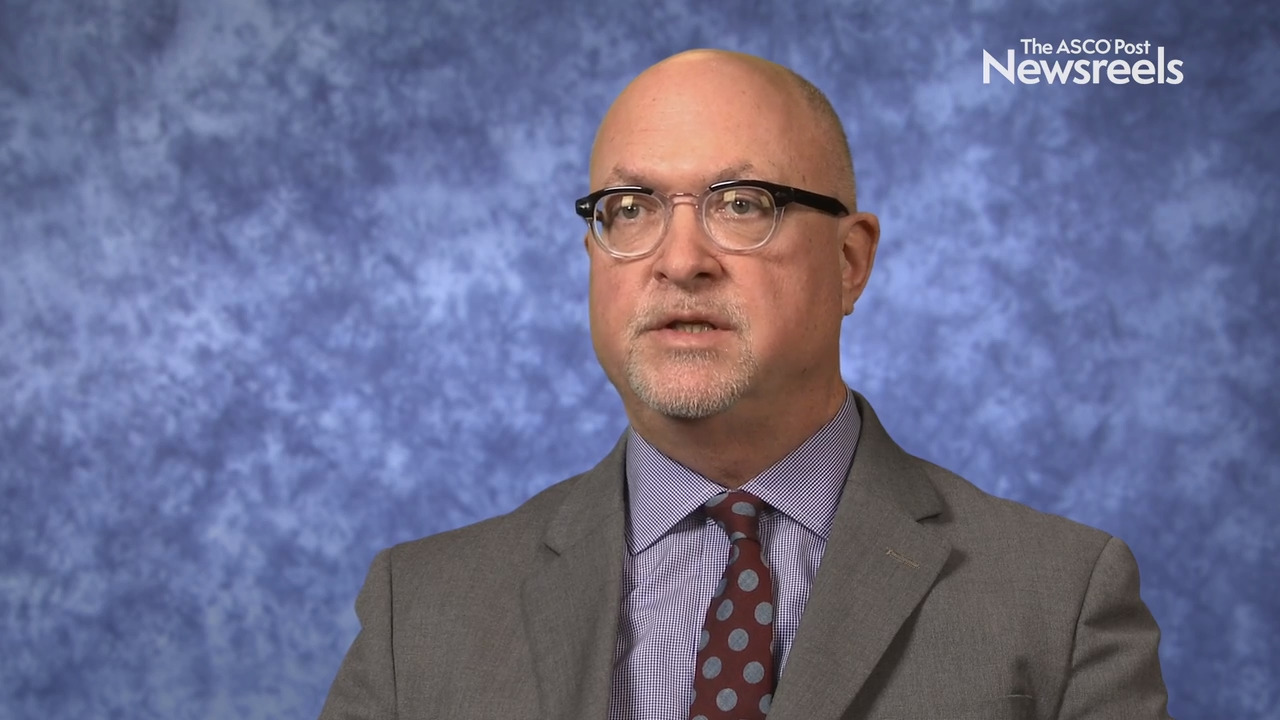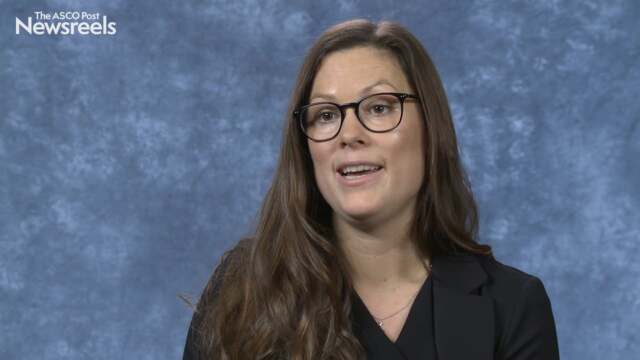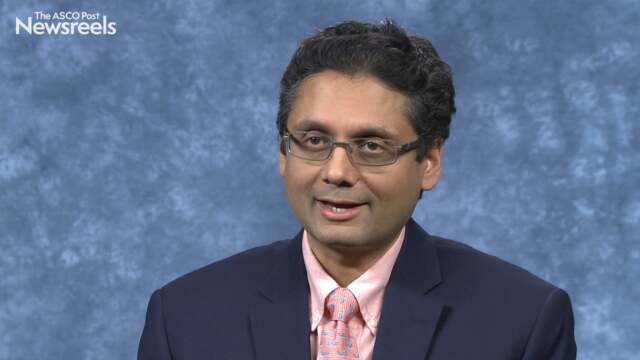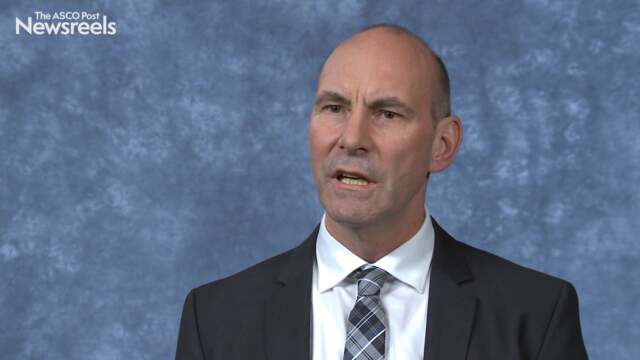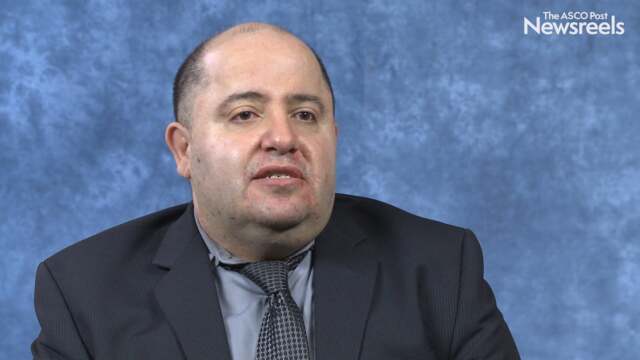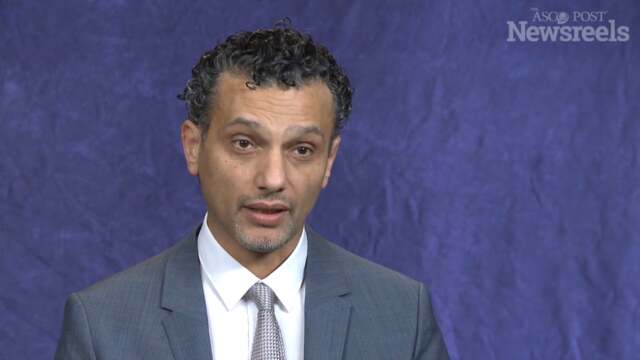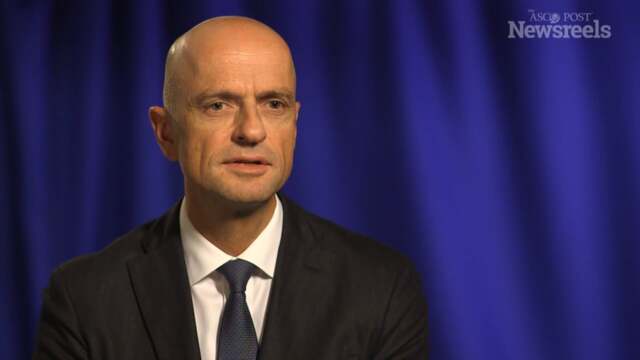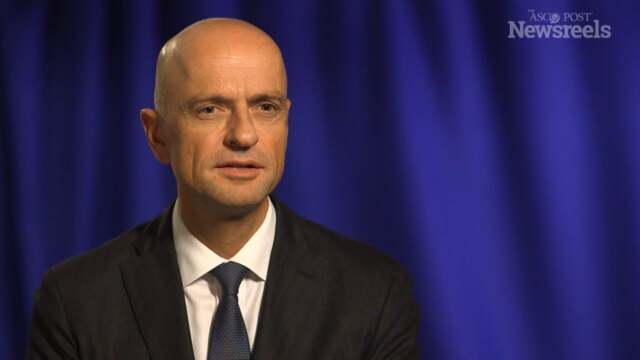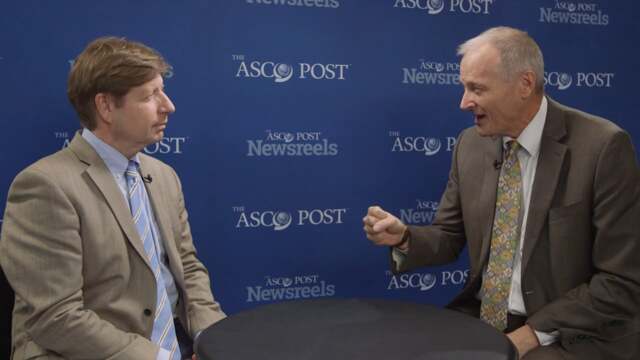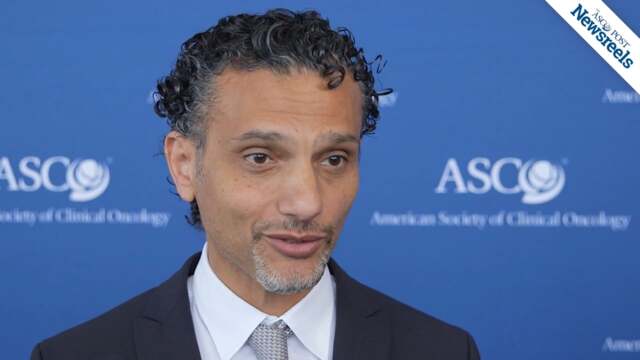Marcel Verheij, MD, PhD, on Resectable Gastric Cancer: Comparing Three Preoperative Regimens
Marcel Verheij, MD, PhD, of Radboud University Medical Center, presents findings from the phase II CRITICS-II trial, which compared three preoperative regimens while omitting adjuvant treatment among patients with nonmetastatic resectable gastric cancer: chemotherapy, chemotherapy followed by chemoradiotherapy, and chemoradiotherapy (Abstract 283).
Matthew Strickland, MD, on Locally Advanced Gastric/GEJ Cancer: Tislelizumab Plus Chemoradiotherapy
Matthew Strickland, MD, of Massachusetts General Hospital, reviews results from the phase IIb TERRIFIC trial, which compared the efficacy and safety of the PD-1 inhibitor tislelizumab plus chemoradiotherapy vs chemoradiotherapy or chemotherapy alone in the neoadjuvant treatment of patients with gastric or gastroesophageal junction adenocarcinoma (Abstract 286).
Daniela Molena, MD, on Surgical Journey in the MATTERHORN Trial
Daniela Molena, MD, of Memorial Sloan Kettering Cancer Center, discusses a comparison of the surgical journeys of patients with resectable gastric/gastroesophageal adenocarcinoma who either received fluorouracil, leucovorin, oxaliplatin, and docetaxel (FLOT) plus durvalumab or FLOT plus placebo in the MATTERHORN study (Abstract 353).
Elizabeth Smyth, MD, on FLOT Administration in the MATTERHORN Trial
Elizabeth Smyth, MD, of the Oxford NIHR Biomedical Research Centre, Churchill Hospital, presents findings from an analysis of the MATTERHORN trial, a phase III study that examined fluorouracil, leucovorin, oxaliplatin, and docetaxel (FLOT) plus durvalumab in patients with resectable gastric/gastroesophageal junction cancer. Dr. Smyth discusses rates of FLOT discontinuation along with event-free survival based on FLOT completion status in the trial (Abstract 343).
Samuel J. Klempner, MD, on Advanced Gastric/GEJ Cancer: Zolbetuximab Plus mFOLFOX6 and Nivolumab
Samuel J. Klempner, MD, of Massachusetts General Hospital, discusses results from the phase II ILUSTRO trial, which evaluated the combination of the anti-CLDN18.2 antibody zolbetuximab plus mFOLFOX6 and nivolumab in patients with CLDN18.2-positive; HER2-negative; locally advanced, unresectable, or metastatic gastric/gastroesophageal junction (GEJ) adenocarcinoma (Abstract LBA284).
Case 3: Radioligands in Advanced Neuroendocrine Tumor
This is Part 3 of Evolving Treatment Paradigms for Neuroendocrine Tumors, a three-part video roundtable series. Scroll down to watch the other videos from this roundtable. In this video, Drs. Daniel Halperin, Jess Maxwell, and Virginia Corbett discuss the use of radioligand therapy for advanced neuroendocrine tumors (NETs). The patient is a 72-year-old man who was incidentally found to have small hypervascular liver masses on screening computer tomography. Abdominal imaging revealed a 1.8-cm pancreatic tail lesion and disseminated subcentimeter liver metastases occupying 20% of the liver parenchyma. A biopsy confirmed a grade 1 NET with Ki-67 1%. In the conversation that follows, the faculty discuss whether they would proceed with surgery or opt for a somatostatin analog, treatment options after disease progression, sequencing considerations when using peptide receptor radionuclide therapy, and more.
Case 2: Well-Differentiated Grade 3 Small Bowel Neuroendocrine Tumor
This is Part 2 of Evolving Treatment Paradigms for Neuroendocrine Tumors, a three-part video roundtable series. Scroll down to watch the other videos from this roundtable. In this video, Drs. Daniel Halperin, Jess Maxwell, and Virginia Corbett discuss the treatment of well-differentiated grade 3 small bowel neuroendocrine tumor (NET). The patient is a 55-year-old man who presents with unexplained weight loss and mild, vague abdominal discomfort over the past 18 months. A computed tomography reveals hepatic metastases in segments VII and VIII and a mesenteric mass along the ileocolic artery with edematous bowel wall in the associated territory, without obstruction. Liver biopsy reveals well-differentiated NET with Ki-67 30%. In the conversation that follows, the faculty discuss how to weigh surgical decisions in patients with well-differentiated vs poorly differentiated grade 3 NETs, whether the radioligand lutetium-177 dotatate would be an option for this patient post resection, and alternatives to radioactive therapy, such as cabozantinib.
Case 1: Pancreatic Neuroendocrine Tumor
This is Part 1 of Evolving Treatment Paradigms for Neuroendocrine Tumors, a three-part video roundtable series. Scroll down to watch the other videos from this roundtable. In this video, Drs. Daniel Halperin, Jess Maxwell, and Virginia Corbett discuss the treatment of pancreatic neuroendocrine tumors (NET). The patient is a 40-year-old woman who presents with right flank pain, nausea, and vomiting. She is found to have hypercalcemia secondary to hyperparathyroidism, and a contrast-enhanced computed tomography reveals multifocal hypervascular lesions in the pancreas. Genetic testing confirms multiple endocrine neoplasia, type 1 (MEN1). In the conversation that follows, the faculty discuss the role of genetic testing in patients with multifocal pancreatic NETs, when surgical resection is appropriate, and potential treatment options for this patient—including temozolomide, everolimus, and radioligand therapy.
Yelena Y. Janjigian, MD, on Gastric/GEJ Cancer: Immunotherapy Plus FLOT
Yelena Y. Janjigian, MD, of Memorial Sloan Kettering Cancer Center, presents event-free survival data from the phase III MATTERHORN trial of the PD-L1 inhibitor durvalumab plus FLOT (fluorouracil, leucovorin, oxaliplatin and docetaxel chemotherapy) in patients with resectable gastric or gastroesophageal junction (GEJ) cancer (LBA5).
Ian Chau, MD, on Gastrointestinal Cancers: Real-World Effectiveness of Nivolumab Plus Chemotherapy
Ian Chau, MD, of The Royal Marsden Hospital, discusses reportedly the first study to evaluate the real-world effectiveness of nivolumab as a first-line treatment of advanced gastric, gastroesophageal junction, or esophageal adenocarcinoma. The combination therapy improved overall survival compared with chemotherapy alone. Dr. Chau presents the 18-month follow-up results (Abstract 295).
Yasunobu Ishizuka, MD, on Gastric Cancer: Does Nivolumab Infusion Time of Day Matter?
Yasunobu Ishizuka, MD, of Japan’s Aichi Cancer Center, discusses study results showing that scheduling infusions of nivolumab monotherapy before mid-afternoon for patients with metastatic gastric cancer may alter treatment efficacy. Several studies have suggested that circadian rhythm is essential in immune system function, including anticancer immunity (Abstract 268).
Lorraine A. Chantrill, PhD, MBBS, on Gastrointestinal Neuroendocrine Carcinomas: First-Line Treatment With Nab-Paclitaxel Plus Carboplatin
Lorraine A. Chantrill, PhD, MBBS, of Australia’s Wollongong Hospital, New South Wales, discusses phase II findings on the combination of nab-paclitaxel plus carboplatin as a first-line treatment for patients with gastrointestinal neuroendocrine carcinomas. According to Dr. Chantrill, this regimen appears to be active in these tumors and warrants further evaluation in a phase III trial (Abstract 589).
Anant Ramaswamy, DM, on Advanced Gastric Cancers: New Findings on Adding Docetaxel to Doublet
Anant Ramaswamy, DM, of Tata Memorial Centre, discusses phase III results of a study that added docetaxel to a doublet regimen of fluorouracil or capecitabine and oxaliplatin, which did not improve overall survival in patients with advanced gastroesophageal junction and gastric cancers. Continuing chemotherapy beyond 6 months also did not appear to improve survival in this population (Abstract LBA248).
Kohei Shitara, MD, on Gastric or Gastroesophageal Junction Adenocarcinoma: Recent Data on Zolbetuximab Plus mFOLFOX6
Kohei Shitara, MD, of Japan’s National Cancer Center Hospital East, discusses the SPOTLIGHT study’s phase III findings on zolbetuximab plus mFOLFOX6 as first-line treatment for patients with the biomarker claudin-18.2–positive and HER2-negative locally advanced unresectable or metastatic gastric or gastroesophageal junction adenocarcinoma. The regimen seems to have led to an improvement in both progression-free and overall survival, with survival benefits also observed across most subgroups. Zolbetuximab plus mFOLFOX6 is potentially a new standard-of-care treatment for this population (Abstract LBA292).
Souya Nunobe, MD, PhD, on Gastric Cancer: 5-Year Follow-up on S-1 Chemotherapy for Stage II Disease
Souya Nunobe, MD, PhD, of Japan’s Cancer Institute Hospital and the Japanese Foundation for Cancer Research, discusses 5-year follow-up results of the phase III OPAS-1 trial, which compared four and eight courses of S-1, a novel oral fluoropyrimidine derivative adjuvant chemotherapy for patients with stage II gastric cancer. These final follow-up findings confirmed the benefit of S-1 and its use for 1 year to treat this population (Abstract 381).
Filippo Pietrantonio, MD, on Gastric or Gastroesophageal Junction Adenocarcinoma: Recent Data on Treatment With Tremelimumab and Durvalumab
Filippo Pietrantonio, MD, of Italy’s Istituto Nazionale dei Tumori, discusses phase II results from the INFINITY trial of tremelimumab and durvalumab as neoadjuvant treatment of patients with microsatellite instability–high (MSI) resectable gastric or gastroesophageal junction adenocarcinoma (GAC/GEJAC). These results open the way to investigate nonoperative management in patients with clinical, pathologic, and molecular complete response after T300/D (300 mg of tremelimumab and 1,500 mg every 4 weeks of durvalumab) (Abstract 358).
Manik A. Amin, MD, on Novel Immune Therapies in GI Cancers: What’s on the Horizon?
Manik A. Amin, MD, of Dartmouth Cancer Center, discusses the future of immunotherapy in gastrointestinal cancers, the challenges of creating effective adoptive cell therapies, and the next generation of immune checkpoint inhibitors.
Gulam A. Manji, MD, PhD, on Gastric and Gastroesophageal Junction Adenocarcinomas: New Data on Pembrolizumab Plus Capecitabine and Oxaliplatin
Gulam A. Manji, MD, PhD, of Columbia University Medical Center, discusses phase II results on perioperative combination chemotherapy and pembrolizumab in patients with resectable gastric cancer. The combination appeared to result in many complete pathologic responses (Abstract CT009).
Francesca Battaglin, MD, on Upper GI Cancers and the Potential Value of Recurrent Neoantigens
Francesca Battaglin, MD, of USC Norris Comprehensive Cancer Center and the Keck School of Medicine, discusses findings from one of the largest studies to investigate recurrent neoantigens in upper gastrointestinal cancers. Dr. Battaglin and her team identified peptides with high human leukocyte antigen–binding affinity and an association with a positive tumor inflammation signature in both microsatellite-instable and microsite-stable tumors, suggesting a role for such antigens as potential cancer immunotherapy targets (Abstract 246).
Zev A. Wainberg, MD, on Gastric or Gastroesophageal Junction Adenocarcinoma: Follow-up Data on Pembrolizumab and Chemotherapy
Zev A. Wainberg, MD, of the University of California, Los Angeles, discusses an update, of 25 additional months, on phase III safety and efficacy results from the KEYNOTE-062 trial. This study compared pembrolizumab with or without chemotherapy vs chemotherapy alone for patients with PD-L1–positive advanced gastric or gastroesophageal junction adenocarcinoma (Abstract 243).
Yu Sunakawa, MD, PhD, on Gastric Cancer: Predicting Treatment-Related Toxicities With Biomarkers
Yu Sunakawa, MD, PhD, of Japan’s St. Marianna University School of Medicine, discusses his findings from the DELIVER trial, which suggest the gut microbiome may predict skin toxicities in patients with advanced gastric cancer who are treated with nivolumab. In addition, some single nucleotide polymorphisms, such as NOTCH1, SEMA4D, NLRC5, and IL-6R genes, may potentially become markers for diarrhea and skin toxicities with this agent.
Kohei Shitara, MD, on Gastric and Esophageal Cancers: Long-Term Follow-up on Nivolumab Plus Chemotherapy
Kohei Shitara, MD, of Japan’s National Cancer Center Hospital East, discusses a long-term data follow-up from CheckMate 649, which support the continued use of nivolumab plus chemotherapy as first-line treatment in patients with advanced gastric, gastroesophageal junction, and esophageal adenocarcinomas (Abstract 240).
Vivek Subbiah, MD, on RET Fusion–Positive Cancers: Efficacy of Selpercatinib
Vivek Subbiah, MD, of The University of Texas MD Anderson Cancer Center, discusses data on selpercatinib that showed promising activity across a variety of RET fusion–positive cancers, including treatment-refractory gastrointestinal malignancies. This analysis highlights the need for genomic profiling to identify actionable oncogenic drivers.
Mary F. Mulcahy, MD, and Crystal S. Denlinger, MD, on NCCN Guidelines Updates: Gastric and Esophageal Cancers
Crystal S. Denlinger, MD, of Fox Chase Cancer Center, and Mary F. Mulcahy, MD, of the Robert H. Lurie Comprehensive Cancer Center of Northwestern University, discuss biomarkers for determining treatment; immune checkpoint inhibitors; when to employ such treatments as platinum/fluoropyrimidine and fam-trastuzumab deruxtecan-nxki; and other second- or later-line therapies such as paclitaxel, ramucirumab, irinotecan-based regimens, and trifluridine/tipiracil.
Rutika Mehta, MD, MPH, on Gastric Cancer: Adjuvant Chemotherapy With S-1 and Docetaxel
Rutika Mehta, MD, MPH, of the H. Lee Moffitt Cancer Center and Research Institute, discusses the 3-year regression-free and overall survival results from the JACCRO study, which compared the efficacy of S-1, an oral prodrug of fluorouracil, vs S-1 plus docetaxel after curative resection of stage III gastric cancer (Abstract 159).
Afsaneh Barzi, MD, PhD, on Disparities in Access to Screening and Treatment of GI Cancers
Afsaneh Barzi, MD, PhD, of the City of Hope Comprehensive Cancer Center and the University of Southern California, discusses reasons for the incomplete understanding of the molecular landscape of minority patients with cancer, lack of screening chief among them. This underrepresentation, Dr. Barzi says, is more marked in gastrointestinal malignancies than other solid tumors, and she recommends ways to improve the outlook.
Zev A. Wainberg, MD, on Gastric/Gastroesophageal Junction Adenocarcinoma: Bemarituzumab and FOLFOX
Zev A. Wainberg, MD, of UCLA Medical Center, discusses phase II results from the FIGHT study, which combined bemarituzumab with modified FOLFOX6 in first-line treatment of advanced gastric/gastroesophageal junction adenocarcinoma. This is reportedly the first randomized trial of any FGFR inhibitor, validating this target in gastric cancer (Abstract 160).
Peter Reichardt, MD, PhD, on GIST: Adjuvant Imatinib for High-Risk Disease
Peter Reichardt, MD, PhD, of Helios Klinikum Berlin-Buch, discusses the 10-year survival analysis of 3 years vs 1 year of adjuvant imatinib for patients with high-risk gastrointestinal stromal tumor. The study found that about 50% of deaths can be avoided with longer imatinib treatment (Abstract 11503).
Brian M. Wolpin, MD, on Performance of a Blood-Based Test for the Detection of Multiple Cancers
Brian M. Wolpin, MD, of Dana-Farber Cancer Institute, discusses a noninvasive blood test evaluating methylation of circulating free DNA. In his study, the blood test detected multiple gastrointestinal cancers at a sensitivity of approximately 81% and a prespecified specificity of > 99%. It also accurately localized the tissue of origin across more than 20 cancer types (Abstract 283).
Zev A. Wainberg, MD, on PD-L1–Positive Advanced Gastric Cancer: MSI and Combined Positive Score and Pembrolizumab vs Chemotherapy
Zev A. Wainberg, MD, of the UCLA Medical Center, discusses the first subset analysis of how a combined positive score in gastric and gastroesophageal junction cancers related to the efficacy of pembrolizumab in PD-L1–positive disease (Abstract 427).
Josep Tabernero, MD, PhD, on Advanced Gastric or Gastroesophageal Junction Adenocarcinoma: Pembrolizumab With or Without Chemotherapy vs Chemotherapy
Josep Tabernero, MD, PhD, of the Vall d’Hebron Institute of Oncology, discusses phase III findings of the KEYNOTE-062 study showing that, for some patients with advanced gastric or gastroesophageal junction cancer, pembrolizumab may improve survival and may be an effective alternative to chemotherapy, with fewer side effects (Abstract LBA4007).
Rongbo Lin, MD, on Gastric Cancer: Results From the FNF-004 Trial
Rongbo Lin, MD, of Fujian Cancer Hospital, discusses phase II study findings on FOLFOX alone vs paclitaxel plus FOLFOX vs intraperitoneal paclitaxel plus FOLFOX as a first-line treatment in advanced gastric cancer (Abstract 6).
Manish A. Shah, MD, on Gastric Cancer: Results From the GAMMA-1 Study on First-Line Combination Therapy
Manish A. Shah, MD, of NewYork–Presbyterian/Weill Cornell Medical Center, discusses phase III data on the efficacy and safety of andecaliximab combined with mFOLFOX6 as first-line treatment in patients with advanced gastric or gastroesophageal junction adenocarcinoma (Abstract 4).
David H. Ilson, MD, PhD, on Gastric Cancer: Results From the TAGS Study on Third-Line Trifluridine/Tipiracil
David H. Ilson, MD, PhD, of Memorial Sloan Kettering Cancer Center, discusses findings on the efficacy and safety of third-line trifluridine/tipiracil in patients with metastatic gastric cancer with or without prior gastrectomy (Abstract 3).
Maria Svensson, MD, PhD Candidate, on Esophageal and Gastric Cancers: Significance of PD-1 and PD-L1 Expression
Maria Svensson, MD, PhD Candidate, of Lund University, discusses high expression of PD-1 and PD-L1 in chemotherapy-naive esophageal and gastric adenocarcinomas, the implications for survival, and the link to a deficiency in mismatched repair genes (Abstract 9).
Manish A. Shah, MD, on Gastric Cancer: Results From the RAINFALL Trial
Manish A. Shah, MD, of Weill Cornell Medicine, discusses phase III study findings on cisplatin plus capecitabine or fluorouracil with or without ramucirumab as first-line therapy in patients with metastatic gastric or gastroesophageal junction adenocarcinoma (Abstract 5).
Florian Lordick, MD, on Gastric Cancer: Final Results From the AIO Trial
Florian Lordick, MD, of the University Medicine Leipzig, discusses study findings on intraperitoneal immunotherapy with the antibody catumaxomab for patients with peritoneal carcinomatosis from gastric cancer (Abstract 4).
Khaldoun Almhanna, MD, MPH, on Gastric Cancer: Results From the CCOG 1102 Trial
Khaldoun Almhanna, MD, MPH, of the H. Lee Moffitt Cancer Center, discusses the long-term outcome of a phase III study that explored the significance of extensive intraoperative peritoneal lavage in addition to standard treatment for ≥ T3 resectable gastric cancer (Abstract 1).
Masanori Terashima, MD, PhD, on Gastric Cancer: Results of the JCOG1001 Trial
Masanori Terashima, MD, PhD, of Shizuoka Cancer Center, discusses phase III study findings evaluating bursectomy for patients with subserosal/serosal gastric cancer (Abstract 5).
Salah-Eddin Al-Batran, MD, on Gastric Cancer: RADPAC Trial Results
Salah-Eddin Al-Batran, MD, of the Institute of Clinical Cancer Research and Nordwest Hospital, discusses study findings on paclitaxel with and without RAD001 in patients with gastric cancer whose disease has progressed after therapy with a fluoropyrimidine/platinum-containing regimen (Abstract 4).
Martin H. Schuler, MD, on Gastric and GEJ Adenocarcinoma: Results of the FAST Study (German Language Version)
Martin H. Schuler, MD, of the University Hospital Essen, discusses in German findings from this phase II trial of epirubicin, oxaliplatin, and capecitabine with or without the antibody IMAB362 as first-line therapy in patients with advanced CLDN18.2+ disease. (Abstract 614O)
Yung-Jue Bang, MD, PhD, on Gastric Cancer: Results From the GOLD Trial
Yung-Jue Bang, MD, PhD, of Seoul National University Hospital, discusses phase III study findings on olaparib and paclitaxel in patients with advanced gastric cancer who have progressed following first-line therapy. (Abstract LBA25)
Martin H. Schuler, MD, on Gastric and Gastroesophageal Junction Adenocarcinoma: Results of the FAST Study
Martin H. Schuler, MD, of the University Hospital Essen, discusses findings from this phase II trial of epirubicin, oxaliplatin, and capecitabine with or without the antibody IMAB362 as first-line therapy in patients with advanced CLDN18.2+ disease. (Abstract 614O)
Marcel Verheij, PhD, and John Marshall, MD, on Gastric Cancer: First Results From the CRITICS Trial
Marcel Verheij, PhD, of the Netherlands Cancer Institute, and John Marshall, MD, of Georgetown University Lombardi Comprehensive Cancer Center, discuss findings from this multicenter phase III study of neoadjuvant chemotherapy followed by either surgery and chemotherapy or surgery and chemoradiotherapy in resectable gastric cancer (Abstract 4000).
Salah-Eddin Al-Batran, MD, on Gastric and GEJ Adenocarcinoma: Results From the FAST Trial
Salah-Eddin Al-Batran, MD, of the Institute of Clinical Cancer Research and Nordwest Hospital, discusses findings from this international phase II study of epirubicin, oxaliplatin, and capecitabine with or without IMAB362, as first-line treatment of gastric and gastroesophageal junction adenocarcinoma (Abstract LBA4001).
